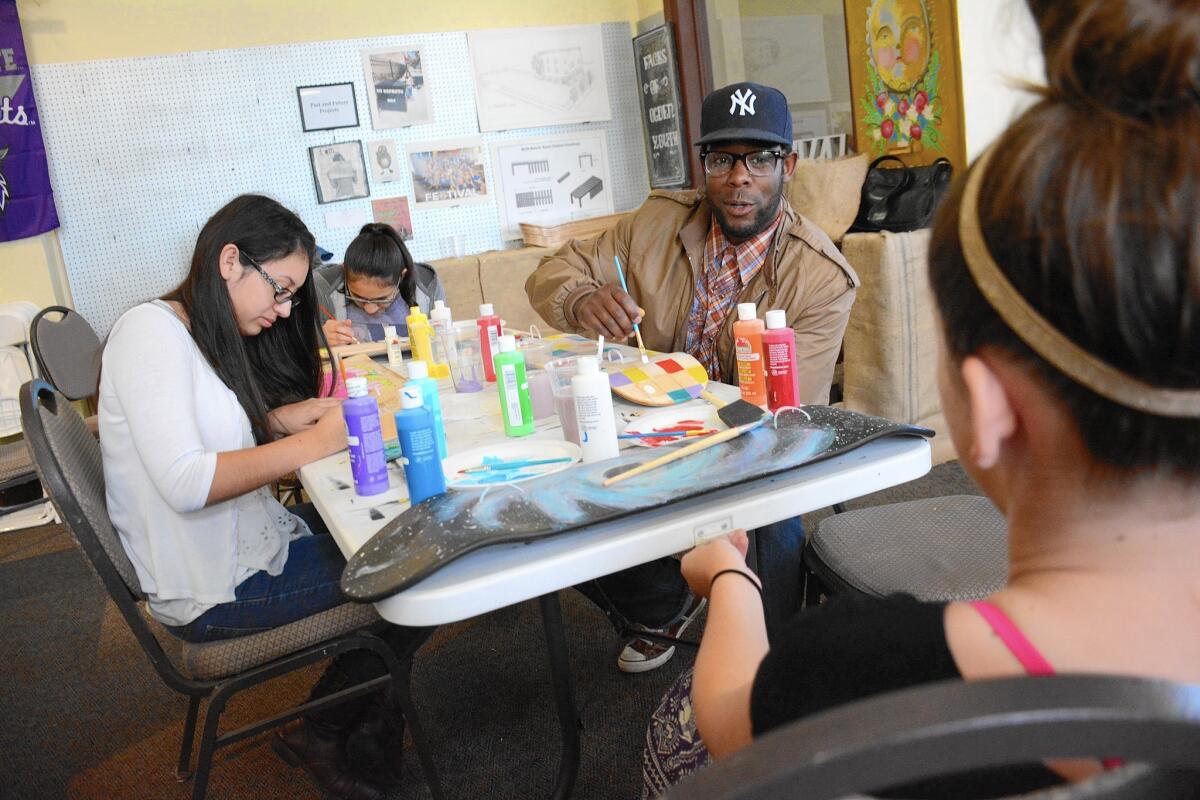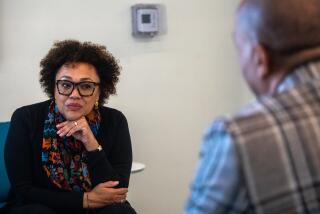In Utah, troubled teens are taught to turn their pain into art

Amir Jackson, center, runs the Nurture the Creative Mind Foundation in Odgen, Utah. “There’s often not a lot of trust at first, so I make myself vulnerable. It’s easier to trust someone who’s vulnerable,” he said.
Whenever Amir Jackson encourages troubled young people to use words and images to plumb their pain, he tells his own story, opening a private vein right there in front of them.
As a child, Jackson wrote “dark and melancholy” poems about fleeing an abusive home in Rochester, N.Y. He reluctantly showed them to an aunt, who asked him where they came from.
“From no place,” he told her. “They’re just words.”
“No,” she said. “They come from somewhere.”
She encouraged him to keep writing. Eventually, a once-invisible boy longing to be seen forged an identity by freeing his writer’s voice. Now 35, Jackson runs the Nurture the Creative Mind Foundation in Ogden, encouraging Utah teenagers to follow his lead.
“I try to explain to students where my pain comes from,” he said. “There’s often not a lot of trust at first, so I make myself vulnerable. It’s easier to trust someone who’s vulnerable.”
Jackson brings self-realized advice to a mostly white state whose roots are steeped in religion. He’s an outlier here, an African American in a New York Yankees baseball cap. His father was Muslim but he grew up Baptist “with a profound respect for spirituality” and briefly converted to the Mormon faith.
But Jackson smooths perceived differences through the piercing reach of his programs: his nonprofit foundation has placed brightly painted, reconditioned pianos around Ogden for those inspired to sit down and play. He has donated free guitars to poor student musicians and organized a one-day Starving for Education hunger strike that raised $3,500.
Students built a “regret box,” in which residents placed written regrets later burned in a public ceremony to symbolically cast them away.
The lesson from these and other foundation activities: It doesn’t take much money to make an impact.
He founded the organization in 2007, and for the first seven years worked full time while running his program at night on $26,000 a year. His budget is now $68,000 — money gained through grants, consulting and speaking engagements. This year, he has been able to pay himself a salary to run the program full time. He’s also hired a dozen instructors, paid $10 to $25 an hour, depending on the project — some based at his headquarters, others out on the street.
The foundation offers programs for students in various artistic disciplines, including radio, theater and photography. The aim is fostering artistic expression but also exorcising demons, as Jackson did through his writing long ago.
The foundation created a youth-produced magazine called “Blank Space,” which included a 15-year-old “Dear Abby” who answered teens’ questions. Jackson helped publish a book of poems by sexually abused teenage girls, as well as an illustrated children’s book called “Freddie the Penguin” about bullying and self-confidence.
He shows teens they don’t have to flee to Seattle or Portland for free expression; it’s right here at home. He concentrates not just on at-risk kids but those from good homes. The last thing he wants to do is typecast anyone.
“He’s a breath of fresh air,” said Amy Midori, 18, the former Dear Abby. “Utah is so conservative, which sucks for free-spirited kids. Before Amir, we didn’t have an outlet.”
It wasn’t easy. Many, including educators, resisted his ideas. Then there was the woman who said, “You don’t seem like a normal black guy.”
“The only exposure most people here get to other races is through TV,” he said. “Utah is not racist — just ignorant from a lack of exposure. And that’s really nobody’s fault.”
Jackson came to Utah to serve in the Air Force. Later, while studying psychology and education at local Weber State University, he brought an idea to his volunteer job as a teaching assistant at a blue-collar elementary school.
He wanted to teach self-empowerment through poetry. The idea was to break down popular song lyrics that were an everyday part of students’ lives, to show that lyrics without melody are really just poems — words without music.
Five teachers rejected his idea before one accepted. The class was a hit. One 12-year-old wrote that she lived inside a cage. Another called on Superman to come save her because “I am in the dark.”
Jackson wanted to be that savior: His own past had prepared him for this.
He coaxed students to write about their pain, and then showcased their efforts. Like his aunt before him, he sought to show young people that he believed in them.
In 2010, at a treatment center for young girls, Jackson encouraged students to write poetry about their pasts. But staff objected: “Here I was, unlicensed and untrained, and these girls were sharing things in class they didn’t even discuss in counseling. People were threatened.”
The poems eventually became a book titled “Yes, I Am STILL Here.” One teen penned “Ignorance Is Bliss,” about her abuse:
Tell me why a child should know the things I do?
And don’t you dare say that it’ll make me stronger, that in the end I’ll be glad.
Because ignorance is bliss.
I want that back.
That year, Jackson opened a space in Ogden’s refurbished train station, now the site of regular seminars and youth strategy sessions.
One sign on the wall says, “Don’t Give Up: Get Creative.” And another: “If Not for Creativity, We’d All Be Dragging Our Knuckles.” He drives a van covered with murals — like an artist bursting with something to say.
Ogden has embraced him. One coffeehouse displays “I Am,” a series of photos that his students took of teens at a reformatory. Because the students could not show faces, each subject wears a mask.
Students at first wanted monster faces, but finally chose a blank mask. “The mask represents how people really see them,” Jackson said. “They don’t feel people see them for who they really are.”
Jackson will soon speak at Weber State about a learning approach with no class bells, grades or standardized tests, one that’s pulling aside Utah’s conservative mask — one student at a time.
Twitter: @jglionna
More to Read
Start your day right
Sign up for Essential California for news, features and recommendations from the L.A. Times and beyond in your inbox six days a week.
You may occasionally receive promotional content from the Los Angeles Times.







